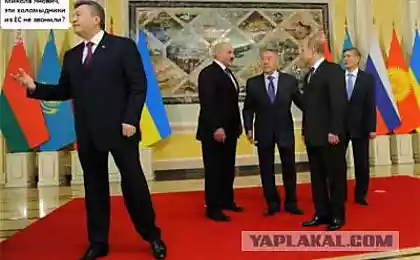505
WebMoney in Ukraine closed
June 12, the Ministry of income and fees of Ukraine reported that achieved in the block associated with the company electronic payment system WebMoney accounts of 60 million USD.
This was reported by Interfax-Ukraine with reference to the statement by the head office to work with large taxpayers Ministry Alexander Klimenko.
"Staff Main Operations Directorate, together with colleagues of the Main Investigation Department of Financial Investigations of the Ministry of income and fees revealed significant irregularities in the company Web Money Transfer in Ukraine", - stated in the central office.
Source

In addition, it notes that at present the bank accounts of companies that were part of the criminal scheme, blocked more than 60 million USD.
In addition, the Central Investigation Department found that the rules of operation of the payment system are not coordinated with the National Bank of Ukraine.
According to reports, during the searches the Kiev office of the company Web Money seized a significant amount of computer equipment which enables operation of the payment system and on which information is stored concerning the activities of the system.
"Users of the system have been online shopping, information services providers and individuals trying to hide illegal financial transactions", - the report says.
Interfax-Ukraine adds that the current investigation is continuing. After their completion, the materials will be submitted to the court to decide on the organizers of the criminal scheme.
Earlier today it was reported that on June 12 the State Tax Service in Kiev, raided the office of the company providing services of instant Internet payments WebMoney (one of the largest in the CIS settlement systems in the network).
Recall that WebMoney - a system of Internet payments, operating in Ukraine since 2003, according to some sources it is used by about two million Ukrainians. WebMoney Transfer - an international system of instant Internet payments, positioning itself as a medium and technology for business and e-commerce. The system ensures the implementation of electronic payments in real time through accounting units - title signs WebMoney.
Earlier it was reported that the Ukrainian National Bank intends to establish a monthly limit of transactions with electronic money in the amount of 25 thousand. UAH. Also, the Office estimated that in the first quarter of 2013, the year the amount of transactions using electronic money has increased by almost 2 times in annual terms, amounting to 511, 331 million UAH.
As reported, the National Bank of Ukraine intends to oblige involved in the money transfer payment infrastructure operators to register with the National Bank of Ukraine.
Recall also that the board NBU adopted a resolution on limiting cash payments between individuals up to 150 ths. UAH September 1, 2013. Earlier, the National Bank has repeatedly stated that the rules for operating in Ukraine payment systems WebMoney Transfer and Yandex did not agree to the procedure stipulated by the legislation. The department in September of 2012 reported that the regulator expects to intensify the dialogue with these systems.
Source:
This was reported by Interfax-Ukraine with reference to the statement by the head office to work with large taxpayers Ministry Alexander Klimenko.
"Staff Main Operations Directorate, together with colleagues of the Main Investigation Department of Financial Investigations of the Ministry of income and fees revealed significant irregularities in the company Web Money Transfer in Ukraine", - stated in the central office.
Source

In addition, it notes that at present the bank accounts of companies that were part of the criminal scheme, blocked more than 60 million USD.
In addition, the Central Investigation Department found that the rules of operation of the payment system are not coordinated with the National Bank of Ukraine.
According to reports, during the searches the Kiev office of the company Web Money seized a significant amount of computer equipment which enables operation of the payment system and on which information is stored concerning the activities of the system.
"Users of the system have been online shopping, information services providers and individuals trying to hide illegal financial transactions", - the report says.
Interfax-Ukraine adds that the current investigation is continuing. After their completion, the materials will be submitted to the court to decide on the organizers of the criminal scheme.
Earlier today it was reported that on June 12 the State Tax Service in Kiev, raided the office of the company providing services of instant Internet payments WebMoney (one of the largest in the CIS settlement systems in the network).
Recall that WebMoney - a system of Internet payments, operating in Ukraine since 2003, according to some sources it is used by about two million Ukrainians. WebMoney Transfer - an international system of instant Internet payments, positioning itself as a medium and technology for business and e-commerce. The system ensures the implementation of electronic payments in real time through accounting units - title signs WebMoney.
Earlier it was reported that the Ukrainian National Bank intends to establish a monthly limit of transactions with electronic money in the amount of 25 thousand. UAH. Also, the Office estimated that in the first quarter of 2013, the year the amount of transactions using electronic money has increased by almost 2 times in annual terms, amounting to 511, 331 million UAH.
As reported, the National Bank of Ukraine intends to oblige involved in the money transfer payment infrastructure operators to register with the National Bank of Ukraine.
Recall also that the board NBU adopted a resolution on limiting cash payments between individuals up to 150 ths. UAH September 1, 2013. Earlier, the National Bank has repeatedly stated that the rules for operating in Ukraine payment systems WebMoney Transfer and Yandex did not agree to the procedure stipulated by the legislation. The department in September of 2012 reported that the regulator expects to intensify the dialogue with these systems.
Source:



















